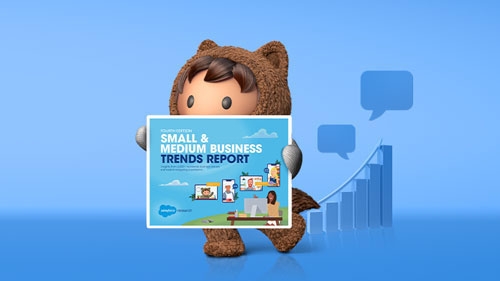Every groundbreaking business starts with a single spark — just one idea. Whether you’re an aspiring entrepreneur looking for inspiration or a seasoned business owner exploring new opportunities, starting a new business is a big deal. But your ideas are even bigger.
We wanted you to have the most successful small business ideas to build your business, so we created a small and medium-sized business (SMB) kick-off list from crafts to tech to get started.
What you’ll learn:
- What is a small business?
- Why start a small business?
- Factors to consider when choosing a small business idea
- Examples of small business ideas
- How to validate a small business idea
- Common startup challenges and how to overcome them
- Best practices for growing a small business
What is a small business?
Technically, a small business is an independently owned and operated company, usually with fewer than 500 employees. The Small Business Administration (SBA) defines small businesses based on industry-specific size standards, which can be a certain number of employees. SMBs are privately owned corporations, partnerships, or sole proprietorships, and they play a significant role in the economy by fostering innovation, creating jobs, and contributing to local communities.
Small businesses don’t always stay small, however. Some of the most recognizable brands — think of the biggest names in computers, athletic gear, and ice cream — started as small businesses with just a handful of employees.
Why start a small business?
Small businesses are born from ideas. They come from entrepreneurs who want the chance to do something they love, a better balance between work and family, and the opportunity to be their own boss.
A top motivating factor for most people — especially those in finance, insurance, and construction — is money. When you own a small business, you control your finances and your destiny. Instead of just working for a paycheck, you are building equity in something you own.
Start with SMB Basics
Factors to consider when choosing a small business idea
Before you dive in, take time to consider whether your small business idea has a good chance of success. Ask yourself:
What is your passion?
To achieve success, focus on work that you genuinely enjoy. Author Martha Sinetar encouraged entrepreneurs to do what they love and the money will follow in her 1980s bestseller. More than a generation later, her advice for small business owners to find their fortune by following their bliss is still relevant.
Is there demand?
One effective way to gauge demand is by conducting market research. Start by identifying your target audience and then send surveys or social media polls, or simply start engaging with them online. Analyze online trends and search volumes using tools like Google Trends to see if there’s interest in what you’re offering.
Who is your target audience?
Marketing dollars are wasted if you can’t identify your potential customers. Create an ideal customer profile to target prospects who are mostly likely to spend their hard-earned money on your product or service.
Who is your competition?
Consider how unique your product or service is. Carefully evaluate your competition and find ways to differentiate your business. Look at your competitor’s offerings, branding, and messaging. If they’re thriving, it’s a good sign that there’s demand.
Are you experienced?
You’ve probably picked up some business skills in your lifetime. If you’re a bit rusty, you can get hands-on training and improve your skillset with Trailhead. Apply the lessons you’ve learned, use your strengths, and leverage your experience to make your new venture a success.
Do you have a bankroll?
While some successful small businesses have been launched with a shoestring budget, it’s less stressful if you have a significant financial cushion. Some options include borrowing money from friends and family, securing an SBA loan, or crowdfunding.
Can your business scale?
Consider if your business has the potential for growth by using artificial intelligence (AI) tools and analytics to make data-driven decisions. Track key performance indicators (KPIs) to measure the effectiveness of growth strategies.
Do you have the time?
Can you dedicate yourself full-time? Here are some ways to start part-time. First, prioritize tasks with the right tools. Create a routine with specific time slots for different tasks to avoid multitasking. Use technology to streamline work, such as project management tools and automation. Set clear work-life boundaries and be sure to delegate tasks to your team to focus on high-priority items.
Do you understand the laws around your business?
Be sure that your small business complies with all local laws, that you have the proper permits and licenses, and that you file taxes properly every year. To find information about local laws for small businesses, you can start by visiting your city or county’s official government website. These sites often have sections dedicated to business resources and regulations.
Do you go local or virtual?
Small businesses can thrive both locally and virtually, each offering distinct benefits. Local businesses foster community engagement, provide job opportunities, and contribute to the local economy. They offer face-to-face interactions, building trust and loyalty among customers.
On the other hand, virtual businesses offer flexibility and a broader reach, allowing entrepreneurs to tap into global markets. They often have lower overhead costs and can operate 24/7, providing convenience for both business owners and customers. Both models have their unique advantages, catering to different needs and preferences in the market.
Finally, will it make money?
There’s not much point in starting a business if it’s not at least a little profitable. Look at the numbers and analyze your business’s long-term financial sustainability. Take the time to calculate all costs, associated fees, overhead, team expenditures, and all income — is it going to make you money? If yes, it’s time to start.
Just get started.
No matter where you are on your journey as a small business owner, you can get started with Salesforce Starter — the all-in-one suite your SMB needs.

Examples of small business ideas
One of the best ways to develop an idea for a small business is to consider your talents. If you’re stuck, here are some ideas to get you started:
Home-based businesses
Small business ideas from home often allow for flexible work schedules, where owners can balance work and personal life more effectively. Operating from home can significantly reduce rent, utilities, and commuting costs, making it an affordable option for startups to scale. Here are some examples:
- Freelance writing: Websites need content. Offer your services as a blogger. But beware: If you haven’t been published, rates can be low at the start. Some outlets offer a fraction of a penny per word. Well-established and disciplined writers, however, can earn more than six figures a year.
- Catering: Many people hate to cook. Create tasty homemade meals for delivery. Rates can vary widely, but cooks and head chefs earn a median of $58,920 per year, according to the U.S. Bureau of Labor Statistics.
- Virtual assistant: If you’re super organized, consider providing administrative support to professionals who can’t commit to a full-time aide. Virtual assistants start at about $20 an hour, but if you’re in a specialized field, you can earn up to $100 an hour, according to CNBC.
Online businesses
Like home-based businesses, online enterprises offer similar benefits — flexible work schedules and affordable startup costs. It’s not required, but it helps to have some experience with computers, especially web design, social media, and marketing. Some online ventures to consider:
- Affiliate marketing: If you already have a blog or website with a loyal following, you could earn commission by promoting other people’s products or services. It can be quite lucrative — more than 15% of people who participate in affiliate marketing bring in at least $50,000 in passive income annually, according to Forbes.
- Social media management: Some folks dread keeping up with the latest online trends. Relieve their burden by offering to post their social media content. And social media managers earn an average base salary of $71,177, according to Sprout Social.
- Drop shipping: No warehouse space? No problem. You can sell products without holding inventory by partnering with suppliers who ship directly to customers. If you invest the time and effort in developing a brand, it can pay off, and we hear it can reach the millions.
Service-based businesses
Instead of selling physical products, service-based businesses offer customers value by providing expertise, skills, or labor. Many service-based businesses earn their reputation based on word of mouth, so building a loyal customer base built on trust is essential for success. Some ventures include:
- Cleaning services: Some people are glad to pay someone to clean their homes for them. It’s a tough job for relatively low pay, but work is often steadily available. Housekeepers and routine home cleaners make a median salary of $29,960, according to U.S. News & World Report.
- Landscaping: If you have a green thumb, you can provide gardening and lawn care services to homeowners and businesses in your area. Landscapers and groundskeepers earn a median salary of $35,890, according to U.S. News & World Report.
- Event planning: Offer your services to handle the details at weddings and parties if you are organized and have an eye for design. Entry-level event planners can make about $30,000 to $40,000 annually, according to Eventify.
Product-based businesses
Some entrepreneurs have a talent for making items and sell their tangible goods to customers happy to pay for unique or handmade items. High-quality and in-demand products will stand out in a crowded marketplace. Some examples include:
- Clothing and accessories: Bedazzle jean jackets, knit sweaters, or paint leather purses with custom designs. You may face some competition with similar sellers on online marketplaces so you may want to brush up on your marketing skills. But full-time crafters have a median salary of $52,910, according to the U.S. Bureau of Labor Statistics.
- Food products: Create and sell artisanal foods such as sauces, desserts, or snacks. Fancy foods are a $207 billion industry, according to the Specialty Food Association. Consider how even a jar of jam has brought a few families from selling at roadside stands to running nationwide enterprises.
- Furniture-making: Design and sell tables and chairs if you’re skilled at working with wood, metal, glass, upholstery, or other materials. Or, rather than making pieces yourself, refinishing and repurposing used furniture can launch a business rooted in sustainability, reclamation, and eco-friendliness. The median hourly rate for a furniture maker is about $21 an hour, according to the U.S. Bureau of Labor Statistics.
Niche businesses
Instead of appealing to the mass market, a niche business caters to a smaller, more defined market. You target certain kinds of customers with specialized products or services that meet specific needs — things that larger companies have overlooked. Some examples include:
- Pet photography: Set up a studio filled with chew toys and take pictures of pets to create lasting memories. If you like animals, it can be lots of fun and can be lucrative. One pet photographer earned $20,000 in her first year, according to Forbes, and is aiming to net $50,000 in year two.
- Personal trainer: Help others achieve their fitness goals through diet and exercise. Exercise trainers and group fitness instructors might partner with a gym to contract their services or work for hire. These entrepreneurs earn a median annual wage of $46,480, according to the U.S. Bureau of Labor Statistics.
- Life coach: Use your talent for giving heartfelt advice to help people find their motivation. It does require a gift for turning experience into relatable actions, but organizations and companies are often looking for storytellers for a variety of niche topics. For business coaching, the average salary in the U.S. is $67,800 a year, according to the International Coaching Federation.
How to validate a small business idea
The next step is to put your idea through a series of checkpoints to determine if it has the potential to be successful. Here are some ways to get started:
- Conduct a SWOT analysis: Identify the characteristics of your business, and determine the strengths, weaknesses, opportunities, and threats.
- Conduct surveys: Gather feedback directly from your target audience through surveys, interviews, or focus groups to gauge interest in your idea.
- Set up a landing page or website: Create a basic website with information about your product or service and track interest through email sign-ups or inquiries.
- Run ads or promotions: Use paid ads or social media promotions to drive traffic to your landing page and measure engagement.
- Test pricing strategies: Experiment with different pricing models to see what your audience is willing to pay.
- Calculate financial growth: Will it make you money? Ensure that your business idea can generate enough revenue to cover costs and achieve profitability.
- Analyze customer behavior and feedback: Track engagement metrics (clicks, sign-ups, purchases) and gather user or customer feedback to refine your idea.
- Test demand with a minimum viable product: Create a simplified version of your product or service to test its performance in the real market.
- Pivot if necessary: Use the data and feedback to refine and improve your business idea before fully launching.
Wait. Starter is just $25 a month?
Salesforce is not just for enterprise! It’s free to get started, and only $25 per month for marketing, sales, service, and commerce — all in one suite.

Common challenges and how to overcome them
Starting a small business (or startup) is more than just achieving financial freedom, it comes with some challenges, including:
Revenue costs: As a startup, you must be ready to cover unexpected expenses like new tools, space to rent, inventory, market downturns, and regulatory changes. Your best bet is to have a nest egg started, and use free tools to get going. You can’t control the market, but you can choose your technology and support.
Lead generation: Gaining your first customers and building a loyal customer base can be difficult. In addition to creating a strong online presence, use social media and digital marketing to attract initial customers. Old-fashioned networking and word-of-mouth can also help you gain traction.
Competition: Do your research on your competitors. Differentiate your business by offering something unique, such as better pricing, superior customer service, or innovative features.
Time management: Entrepreneurs often wear many hats, making it difficult to prioritize tasks and manage time effectively. Use project management tools, delegate tasks, and create goals to stay organized. AI built for business can save time by automating repetitive chores and maximizing productivity.
Hiring the right team: Building the right team is crucial for your growth and success. Be strategic in hiring by defining clear roles and expectations. Consider hiring freelancers or contractors to keep costs low.
Legal and regulatory issues: Consult a legal professional to ensure compliance with all laws. Use resources like small business associations for guidance and consider purchasing legal insurance to protect against unforeseen issues.
Market changes: Stay nimble and be prepared to pivot if necessary. Continuously gather customer feedback, stay updated on industry trends, and be willing to adapt your business model to meet new demands. Salesforce can help by keeping you up to date on the latest AI and technology to help your SMB grow, just sign up for the newsletter, and stay up to date on market changes.
The great news is, that Salesforce can help you overcome most of these. With an all-in-one suite, we can get you started for free.
Best practices for growing a small business
Some of the best small business ideas get even bigger with the right strategies. Now, it’s time to think about how to scale your small business.
First, focus on customer satisfaction. Exceptional customer service is a must these days. Actively listen to your customers to find ways to improve your products or services.
Next, create a positive company culture that motivates employees to help you achieve your business goals. Invest in your employees by offering training and development opportunities, and support their emotional well-being with mental health awareness days.
Finally, the right kinds of tools can go a long way to streamlining operations. Improve productivity by getting the right CRM software. Review and optimize processes to eliminate inefficiencies and cut costs. Monitor key performance metrics to identify areas of improvement.
Other steps to take:
Expand your offerings: Develop products or services that meet your customers’ changing needs. Explore cross-selling and upselling opportunities to increase revenue per customer with sales AI.
Extend your reach: Identify new markets where your business can grow. Collaborate with influencers to create beneficial partnerships. Look for cross-promotional opportunities to boost brand awareness.
Adapt with AI: Stay updated on artificial intelligence (AI) trends and customer preferences and adapt your offerings accordingly. Be open to experimenting with everything from sales to service using AI-powered automation to stay competitive.
Leverage customer relationships: Use CRM tools to track interactions, sales data, and engagement opportunities. Encourage customers to share testimonials and reviews to build social proof and attract new clients.
Prepare for scaling up: As you expand, be sure to have the resources, team support, and tools to handle increased demand. Monitor growth metrics and adjust strategies based on performance and market conditions.
Small business, big rewards
Now you have some of the best small business ideas, tools, and techniques to get started. And, we are here to help. With Salesforce Starter, everything that you need is built in, allowing you to focus on your idea becoming reality. Take the leap — your small business idea could be the next big thing.






























